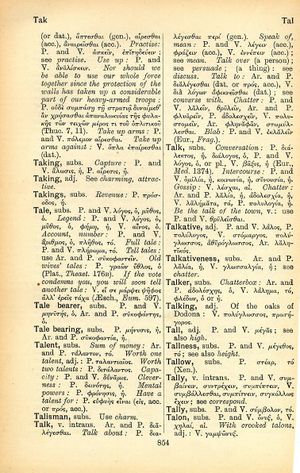talk
Ἕωθεν προλέγειν ἑαυτῷ: συντεύξομαι περιέργῳ, ἀχαρίστῳ, ὑβριστῇ, δολερῷ, βασκάνῳ, ἀκοινωνήτῳ: πάντα ταῦτα συμβέβηκεν ἐκείνοις παρὰ τὴν ἄγνοιαν τῶν ἀγαθῶν καὶ κακῶν. → When you wake up in the morning, tell yourself: The people I deal with today will be meddling, ungrateful, arrogant, dishonest, jealous, and surly. They are like this because they can't tell good from evil. | Say to yourself in the early morning: I shall meet today inquisitive, ungrateful, violent, treacherous, envious, uncharitable men. All these things have come upon them through ignorance of real good and ill.
English > Greek (Woodhouse)
verb intransitive
Ar. and P. διαλέγεσθαι.
talk about: P. διαλέγεσθαι περί (gen.).
speak of mean: P. and V. λέγω, λέγειν (acc.), φράζειν (acc.), V. ἐννέπειν (acc.); see mean.
talk over (a person); see persuade; (a thing); see discuss.
talk to: Ar. and P. διαλέγεσθαι (dat. or πρός, acc.), V. διὰ λόγων ἀφικνεῖσθαι (dat.); see converse with.
chatter: P. and V. λαλεῖν, θρυλεῖν, Ar. and P. φλυαρεῖν, P. ἀδολεσχεῖν, V. πολυστομεῖν, Ar. φληναφᾶν, στωμύλλεσθαι.
blab: P. and V. ἐκλαλεῖν (Eur., Fragment).
substantive
conversation: P. διάλεκτος, ἡ, διάλογος, ὁ, P. and V. λόγος, ὁ, or pl., V. βᾶξις, ἡ (Eur., Medea 1374).
intercourse: P. and V. ὁμιλία, ἡ, κοινωνία, ἡ, συνουσία, ἡ.
chatter: Ar. and P. λαλία, ἡ, ἀδολεσχία, ἡ, V. λαλήματα, τά, P. πολυλογία, ἡ.
be the talk of the town, v.: use P. and V. θρυλεῖσθαι.

